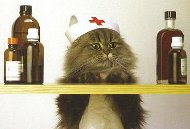First aid treatments are temporary measures to use until you can get your pet to a veterinarian. In an emergency, the treatment you give an animal in the first few minutes can save its life.
Be sure to have emergency phone numbers in multiple locations. You should keep them on a card in your wallet as well as several places at home, such as on the fridge, inside cupboard doors, and on your first aid kit. If you live in a multi-story house, have phone numbers listed on each floor, not just in the kitchen. Do some research in your area now, before an emergency strikes, to find out what kind of emergency veterinary services are available. You should have numbers for a twenty-four hour clinic and a veterinarian who makes house calls. Keep these numbers with the numbers for your veterinarian and a veterinary poison control line (see Poisoning).
Quick Links
- Allergic Reaction
- Artificial Resuscitation
- CPR
- Bandaging
- Bleeding
- Bloat
- Breathing Stopped
- Burns
- Car Accidents
- Choking
- Collapse
- Convulsions
- Cuts – See Punctures
- Fasting
- Fever
- Fractures
- Gunshot Wounds
- Heart Stopped
- Heat Stroke
- Hemorrhage
- Insect Bites and Stings
- Pain Relief
- Poisoning
- Poultices
- Punctures and Slivers
- Shock
- Tick Removal
For a list and description of first aid supplies you should have on hand, click on First Aid Kit.